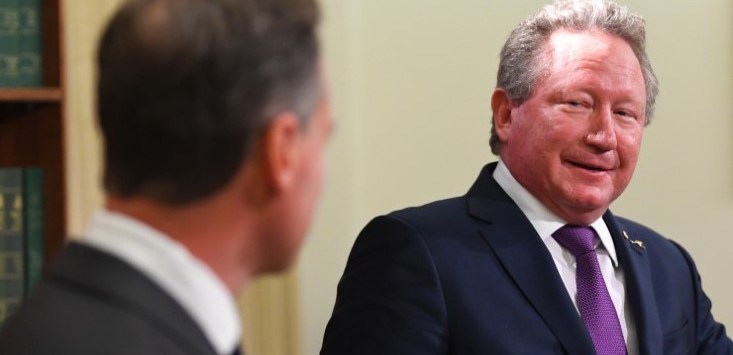
Fortescue Metals chairman and founder Andrew Forrest.
Australian mining magnate Andrew Forrest has slugged Meta — Facebook’s new name — with its “first-ever” criminal charges over his name and likeness being used in clickbait ads, in what the billionaire hopes will see the social media titan take responsibility for scams on the site.
It all began when Forrest’s face popped up in supposed ads for cryptocurrency back in March 2019 — they falsely claimed Forrest accumulated his $27 billion by trading coins, while also splashing about the famous faces of actor Chris Hemsworth, media personality David Koch, ex-NSW premier Mike Baird and businessman Dick Smith.
The Fortescue Metals Group chairman was incensed, publicly appealing to Facebook’s founder Mark Zuckerberg to intervene in November 2019, to no avail. But Forrest’s court action, he says, is more than a personal gripe — it’s on behalf of “innocent Australians who don’t have the resources to take on companies like Facebook”.
“This action is being taken on behalf of those everyday Australians — mums and dads, grans and grandads — who work all their lives to gather their savings and to ensure those savings aren’t swindled away by scammers,” he says.
Forrest has also launched civil proceedings in California against Facebook, saying although was acting locally for Australians “this is happening all over the world”.
He continues that it is the first time criminal charges have been brought against Facebook, which will be heard in the Western Australian magistrates court after Forrest got the green light from the Attorney-General to launch the action under the Commonwealth Criminal Code.
In the unique case, Forrest alleges Facebook breached anti-money laundering laws and was “criminally reckless” by allowing criminals to pay for the advertisements which defraud Australians out of millions of dollars, while also failing to create either controls or a corporate culture that would prevent its systems from being used to commit crime.
“Social media is part of our lives, but it’s in the public interest for more to be done to ensure fraud on social media platforms is eliminated or significantly reduced,” Forrest says.
If Facebook is found guilty, they would likely face hefty fines ∞ though it could be a drop in the water considering the vast scope of the company — even with a record $332 billion wiped off the market value this week, as an overblown forecast met a sharp increase in expenses.
A spokesperson from Meta said they were not able to speak to the court action, but stressed to the ABC the company takes scams seriously.
“We don’t want ads seeking to scam people out of money or mislead people on Facebook — they violate our policies and are not good for our community,” the spokesperson says.
“We take a multifaceted approach to stop these ads, we work not just to detect and reject the ads themselves but also block advertisers from our services and, in some cases, take court action to enforce our policies.
“We’re committed to keeping these people off our platform.”
So what happens now? An initial hearing before the WA Magistrates Court will be held on 28 March, with a committal hearing likely to follow later this year.
As for the US civil case, it was filed in September 2021 and is pending in the Superior Court of California.
Handpicked for you

What are ‘virtual influencers’ and should Meta be the one to set their ethical guidelines?



COMMENTS
SmartCompany is committed to hosting lively discussions. Help us keep the conversation useful, interesting and welcoming. We aim to publish comments quickly in the interest of promoting robust conversation, but we’re a small team and we deploy filters to protect against legal risk. Occasionally your comment may be held up while it is being reviewed, but we’re working as fast as we can to keep the conversation rolling.
The SmartCompany comment section is members-only content. Please subscribe to leave a comment.
The SmartCompany comment section is members-only content. Please login to leave a comment.